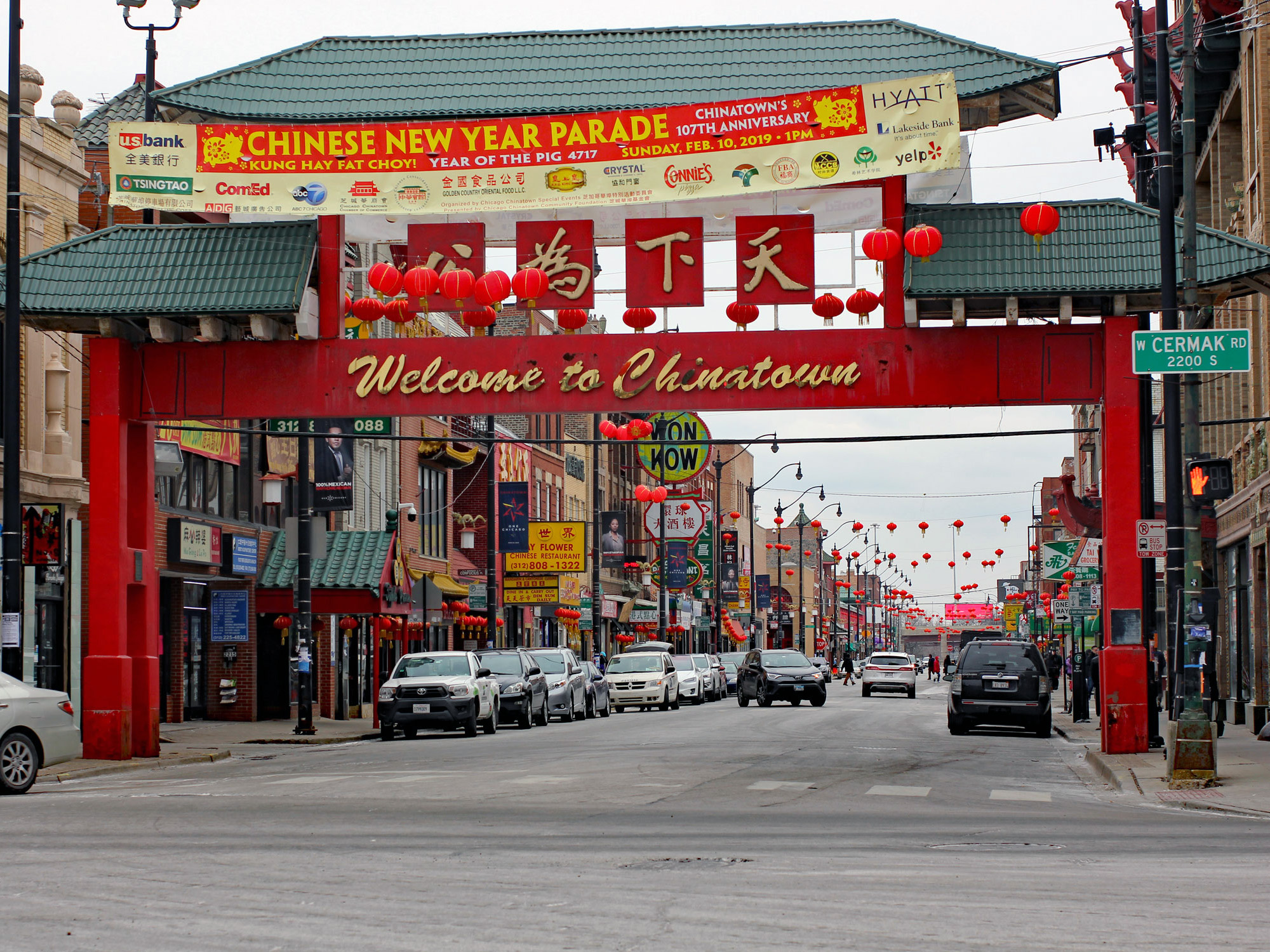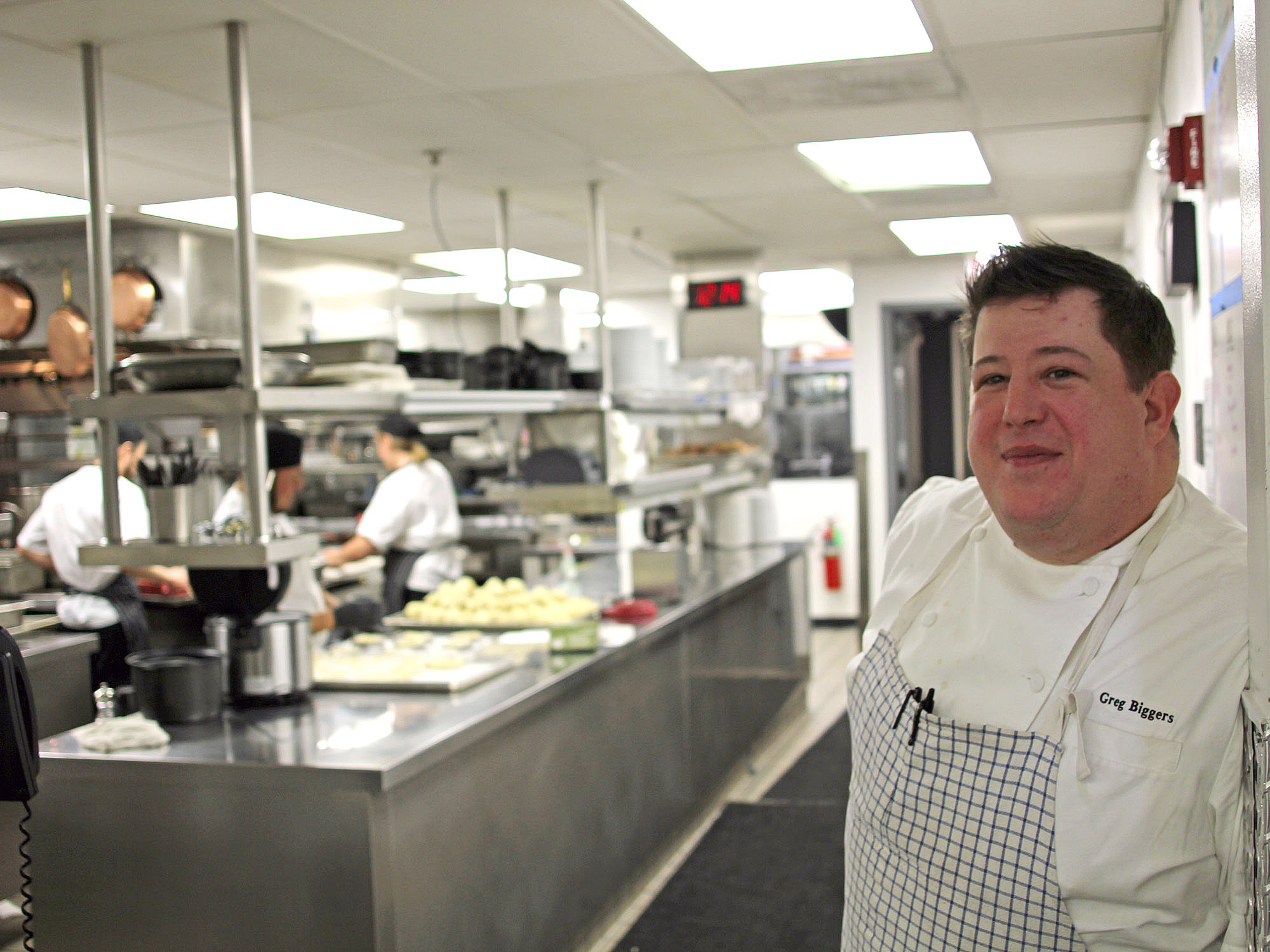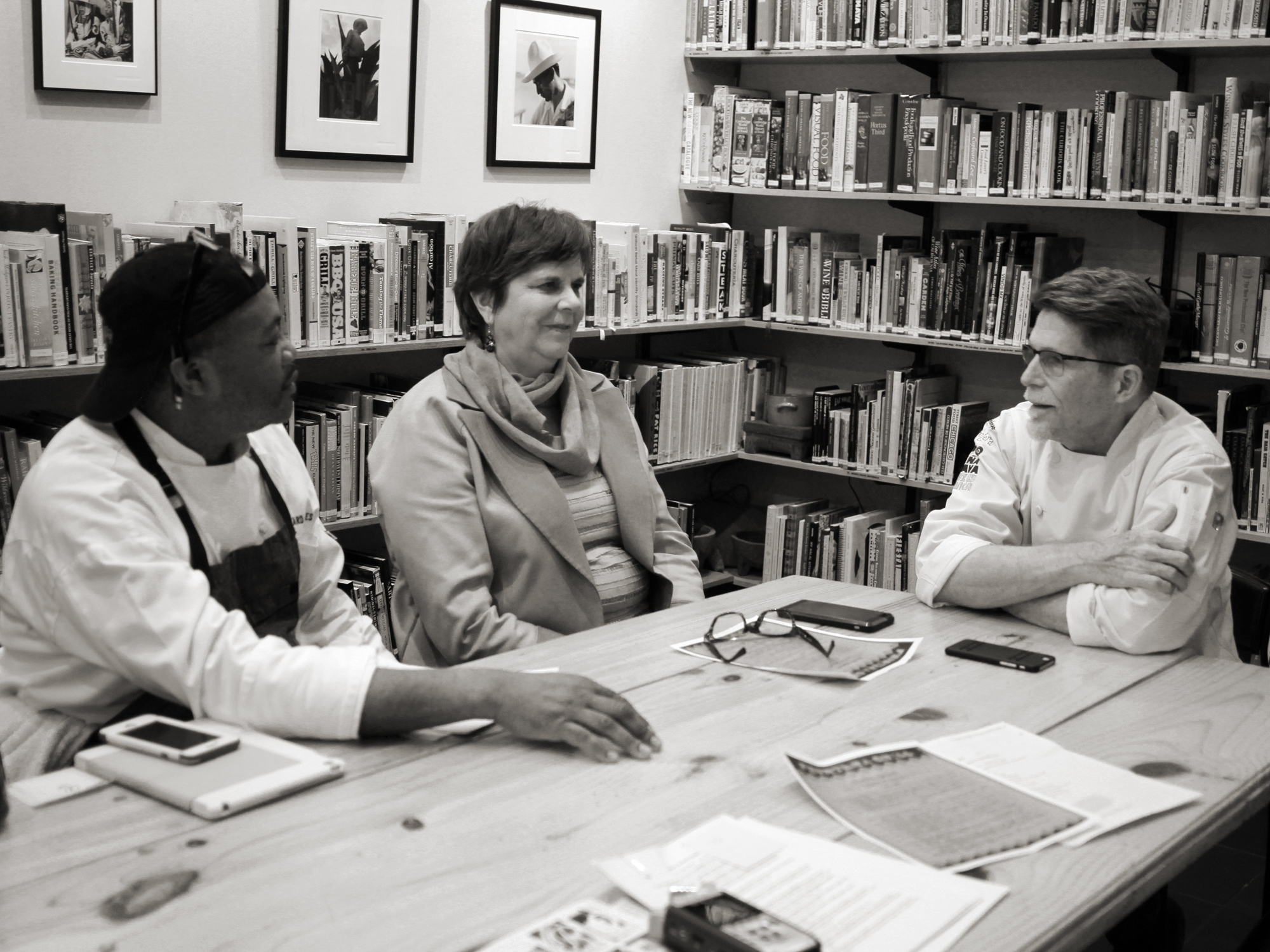“NOBODY WANTS TO TALK ABOUT a restaurant that’s 35 years old, I guess,” Tony Mantuano muses as we sit down to chat in Spiaggia.
Not that he really has cause to complain that new restaurants get all the attention. That very day, Eater is running a piece about his new restaurant, with Joe Maddon in the Wrigley Field shopping-and-dining district. And Spiaggia has a current chef de cuisine, Joe Flamm, who recently won Top Chef (as he quickly corrects me, with a smile, “We’ve had two chefs who almost won Top Chef,” the other being Sarah Grueneberg of Monteverde). And he has a Michelin star, and a James Beard award for Best Chef Midwest. And it was famously the Obamas’ favorite Chicago restaurant.
Still, a 35-year-old Italian restaurant on Michigan Avenue sounds like a place of which everything that can be said has been said. I wrote about it on the occasion of its 30th anniversary, when the dining room with its stellar views out toward Lake Michigan (technically just the second floor, but high enough to be at least the third) was redecorated, trading 80s green marble for chic black and white.
So everybody knows what Spiaggia’s about; there’s no shocking news that’s going to be broken in the conversation we had. Instead, this is a very Italian conversation about savoring the good life, and life’s accomplishments, and the path that put Mantuano in charge of the restaurant; he opened it, there was a detour to open other restaurants (Tuttaposto, Mantuano’s Italian Table), and then he returned and he’s been there for two decades straight. Chatting with Il Gattopardo.
Spiaggia came in at the very beginning of the rise of Chicago food’s culture—three years before Charlie Trotter and Rick Bayless, in fact—and like them, Kenosha-born Mantuano established a place at the top in Chicago for a cuisine that wasn’t French. Long-lived Italian restaurants have a tendency to become nostalgia acts—Italian Village, Tufano’s, Orsi’s, or Bruna’s are all slices of another time in varying shades of amber. I have reason enough to feel nostalgic there—my wife and I had our wedding reception in Spiaggia’s now-gone event space—but Spiaggia is not interested in going down that path; it wants to keep its place among Chicago’s current high end dining spots, even as Italian is hardly the hot new thing in Chicago that Spiaggia helped make it in the 80s and 90s. So here is the conversation we had before service one night last week.
FOODITOR: Tell me what’s new. At thirty years you redecorated the place, you haven’t done that again…
TONY MANTUANO: We did that at thirty, yep. Now, I don’t think we can really talk about Spiaggia without some sparkling Italian wine. (Reaches for bottle of Ferrari sparkling rosé) You know the story of Ferrari?
I don’t.
This is a family that’s been making wine longer than the automobile’s been around. And when the automobile came along and became very famous, they tried to buy this name several times. And they were like… no, it’s ours. We were here first.
Cars are just a fad.
Right. Cheers. (We clink glasses.)
Now, they’re at the Grammys, they’re everywhere. They sponsor so much, it’s an incredible family to be associated with.
(He takes a thoughtful sip.)
What makes me feel great about Spiaggia today is just that we’ve been able to develop so much talent that’s come through the place. I mean, right now, Joe Flamm, and before him it was Sarah, and before her it was Missy Robbins. We tried to put together a family tree of chefs here, and I can’t complete it, because I keep thinking of another guy, another chef somewhere. Someone who’s not even a chef, but had spent time here.
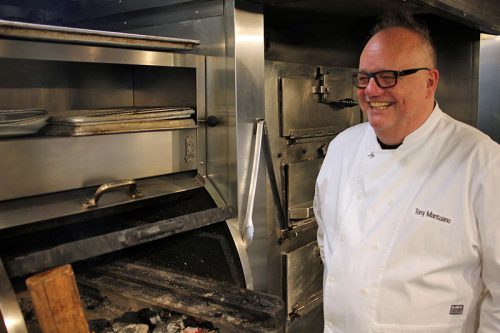
Tony Mantuano
It’s one of those places that you go to if you want to learn to cook Italian, I guess, in this city. We’re going to teach you the right way. That’s what I’m hoping our legacy is, and that all started 37 years ago, when we first went and lived in Italy, and we worked in restaurants in Italy—when I say we, I mean Cathy Mantuano and I, and she’d work the front of the house and I’d work in the kitchen.
And they’d be like, “You know, whenever somebody in the States wants to open a really good Italian restaurant, they usually call and we send them a chef. But you guys are the first ones that are over here,” workin’ in the kitchens, before the word “stage” meant something. We worked in six different restaurants, and I don’t remember ever seeing any other Americans. I saw Japanese, but they’d always say, you guys seem to be the first Americans over here.
And a lot of those restaurants still exist today. Like, the place we always send people, where we sent Joe, where we sent Sarah, is Dal Pescatore, which 35, 37 years ago, the chef was Nadia Santini, and she was pregnant in the kitchen at the time that they were there. And now that child is the executive chef of the restaurant. And like, Nonna Bruna, the grandma, who was in the kitchen every day making pasta when we were there, Joe was there two years ago and she was still making pasta.
There’s such an elegance there, and that place influenced Spiaggia a lot. Because when we came back, an Italian restaurant at this level? Unheard of. It was French. So that’s what we shot for, and in the beginning, famous restaurateurs, whose names I won’t mention, they were all, “You gotta put a meatball on it.” Of course, now meatballs are all the rage, but they weren’t in 1984. “You’re never gonna make it, kid,” they would say.
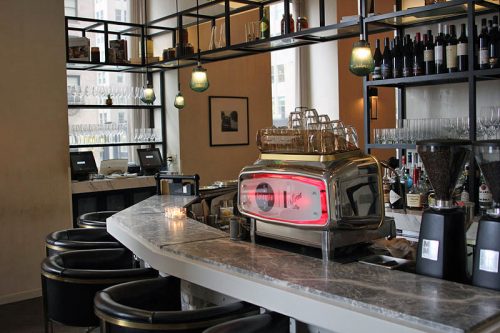
Cafe Spiaggia, the more affordable kid brother
What was it like opening in this area—was this a good restaurant neighborhood then?
It’s always been such a crazy, high-fashion neighborhood, still is. But West Loop didn’t exist then, Logan didn’t exist then, this is where you wanted to have a restaurant then. Maybe you ventured into Lincoln Park. And now, there’s like no restaurants here—obviously there are some, but it’s not a hot restaurant neighborhood.
When I first moved here, that was a big Friday night for my wife and me—Cafe Spiaggia, usually, because it was more affordable, but it had that great view, and you had good Italian food, what more did you want from the big city?
You don’t need anything else. But, people get old, people get gray—not you or I, of course, but our clientele got older and older. And the next generation was like, I don’t wanna go to my parents’ restaurant. I want to try something new. And so the restaurant scene started to spread out.
We work so hard to try and stay current, and I think the young talent we put through here is part of it. The menu changes all the time, and I’m very collaborative—I don’t think it’s my way or the highway. I want to develop talent, and I want to show them, when I can take the training wheels off, I let them go. I taste everything, everything comes through me, but I want the restaurant to evolve. I don’t want it to stay the same. We’re known for Italian food, and as long as we stay true to that, and the culture of Italy, we will always be relevant.
But it’s something we’re constantly thinking about—how does a restaurant last this long? You have a supportive company behind you that lets you just focus on being a great restaurant, you bring the right talent in—Rachel Lowe is one of the few somms in the city that’s still working the floor, and how many restaurants even have somms these days? It really is bringing in great talent, bringing in young talent. People are going to leave. You have to accept that, you can’t hold on to people. There’s times that I tell people after two years, you need to move on. You’re only 26 years old, you’ve learned as much as you can learn here, you need to go learn something else. And I’ll help them find a place.
He’s telling Biden and Kerry, “Have you guys ever eaten at Spiaggia in Chicago? You gotta go there! It’s unbelievable!” And I’m thinking, this is the prime minister of Italy, selling my restaurant to them.
Joe is a great example of someone who has worked his way from being the Cafe Spiaggia sous chef to now running the entire joint. And everyone loves working with him. A lot of restaurants will tell you, it’s so hard to find people, it’s so hard to hire people. We don’t have that problem. People want to work for Joe. And he focuses on teaching them how to sharpen their knives, how to butcher, all the things that you should be learning as a young chef. They like that, and there’s some discipline, but there’s also fun.
When you opened, and you were trying to follow Italian models, what did that mean in 1984?
In the beginning it was really hard to find great stuff, great ingredients. There was no internet, there was no FedEx for food. In what is now a locker room, we were growing our herbs—I couldn’t find fresh basil in 1984. Unless you grew your own shit, you couldn’t find it. And radicchio—it took me a long time to get people to understand the difference between red cabbage and radicchio. Finding a source for olive oil and balsamic vinegar, where the olive oil wasn’t rancid and seven years old.
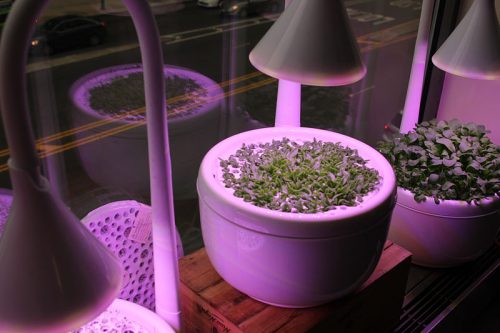
Herbs with the best view in town
So the struggle, really, from day one, has been to find the right ingredients, and it’s much easier today. Now it’s much more local, from local farms, the meat and the produce. Everything is super-local now, and that stuff didn’t exist 35 years ago. But it’s a different world now. When Joe went to work at Dal Pescatore, which is in the middle of Lombardy, the middle of nowhere—there’s maybe a hundred people that live in this town—one of the first things he said was, how the hell did you find this place? He has GPS to find it now. I had a paper map!
What’s been on the menu since the beginning?
The gnocchi, for sure. That way of making gnocchi that we do, the style, the shape. Fresh pasta has been a hallmark of Spiaggia—we just built this pasta table (he points to a marble table at the end of the bar) and all the pastamaking equipment is going to go there. We’re going to make our pasta, fresh, here. It’ll all be finished by the time guests get here, but what a great table to have a drink at. We’re always tinkering.
Like, the rage today is cooking with live fire, cooking with wood. We’ve been doing that for 35 years. When we put that wood oven in, even the city was like, what is this? Just think of it like a fireplace…
Cooking with charcoal and wood for 35 years—that defines us. Fresh pasta for 35 years—that defines us. It’s just funny to see that stuff today is what the next generation of chefs wants—okay. We’ve been doing it all along.

Arancini, ready for service
How has Italian food evolved over the 35 years, then?
Um… I think it’s just gotten more hyper-regional. It isn’t just lasagna everywhere, people know and will focus on regions. Like Abruzzo and Molise, or Umbria. There’s really interesting food happening, and there has been for a while, but Americans don’t necessarily visit those places.
Cathy and I recently got our Italian citizenship because of our grandfathers, and her grandfather came from the region of Molise, which no one knows, because it wasn’t even a region until 1960-something or 70-something. It was always Abruzzi e Molise, and they would call them the Abruzzi. Molise is very agricultural, and it’s incredibly beautiful. It has seashore, and I’ve had incredible seafood there.
But they don’t get any tourists. With her grandfather being from there, we were able to work with the local government there, and it was much easier to get our citizenship there—because they want tourists. One of the things they ask of you while you’re there is to remain in the region for two weeks, while this is happening, which also guarantees some tourism.
Anyway, there’s interesting stuff all over. And I think what’s changed is that more and more people understand that there’s good food everywhere in Italy, it’s not just a basic one cuisine.
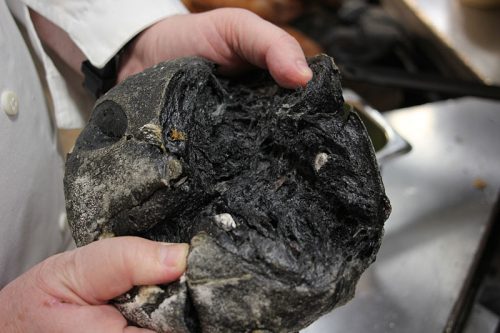
Grana arso (burnt flour) bread, baked for them by Floriole Bakery, in case you think Goth bread is a new thing
Chicago seems traditionally to have been heavily Sicilian, Calabrese, in terms of Italian population, so it’s super-strong red sauce with lots of garlic. And it did seem to happen starting in the 1980s, recognizing that Italy has subtlety in other ways.
And people understand that Italy, it’s the top of the fashion world, of automobiles—why not food? It’s there, there’s incredible high end restaurants in Italy. It’s there. It’s not just your Nonna’s red sauce. That’s delicious—my Nonna made a great red sauce and she was from Calabria—but there’s an elevation there, too.
It’s incredible, too, the amount of winemakers in Italy now. Did you ever know Henry Bishop [longtime sommelier at Spiaggia who died in 2009]?
I just knew of him.
He influenced me a lot with wine, and the wine list that he wrote when we opened. He brought so much light to Italian wines. When you go to Italy, every winemaker knew of Henry. He was an essential part of the history of Spiaggia.
What really helps is that when winemakers are here in Chicago, they come here. And they invite you to see what they’re doing when you’re over there. That relationship that we have is pretty special. Joe and I did a state dinner at the State Department, this was in the October before Obama left office, and it was for 250 people in the State Department ballroom for Matteo Renzi, who was the prime minister of Italy at the time. And they’re like, right before we eat lunch, we’d like you to meet the prime minister in a little side room. Fantastic.
So I walk in the room, and Matteo Renzi is in the room with Joe Biden and John Kerry. And he sees me and he starts waving to me, Get over here, come on! I say, can I go over there? I get over there, and he’s telling Biden and Kerry, “Have you guys ever eaten at Spiaggia in Chicago? You gotta go there! It’s unbelievable!” And I’m thinking, this is the prime minister of Italy…
Selling your restaurant to them.
Selling my restaurant! It was one of the most incredible moments. He was the mayor of Florence before then, and he’s like, “I’ve eaten there two or three times,” and I didn’t even know he’d been in… of course, John Kerry came in the next week.
That validates it, right there. This restaurant has a great reputation in Italy, and I’m humbled by that. It’s pretty cool. I mean, they loved the idea of Obama, and they loved that when he won the election, they celebrated here, at an Italian restaurant. Every television station, everybody in Italy wanted to interview us.
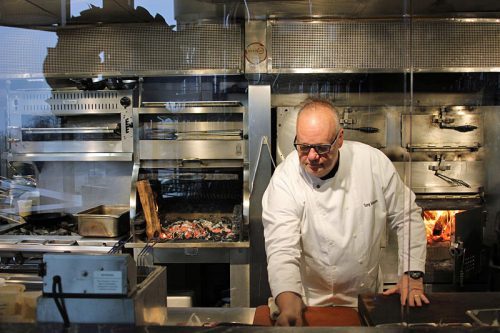
Spiaggia’s open kitchen
Has Joe winning Top Chef had an effect on who comes to Spiaggia?
It’s brought a whole different crowd here. A lot of nights it’s fan night, and they know their food, too, it’s not like they’re out of their element. But they’re fans of the show.
Are they from Chicago, or from out of town?
They’re from everywhere.
The only thing we’ve never really had before, was a bar crowd. And now we have a bar crowd. And people eat at the bar, every night that bar is full. I don’t know if that’s because Joe won—it is a bit younger—but, we’re happy about it!
One of the things I feel that has happened in Chicago in the last few years is, there’s so much Asian influence now. Are you tempted by any of that now, or does it seem too far out of your area?
I love to eat it…
But not to mix it in your food?
Naah. I have a theory about this, and I tell Joe, because Joe worked for Stephanie [Izard] and he worked for Bill Kim, so he knows how to cook like that really well. And I say, that’s why on cooking competitions, if you’re cooking Asian, you blow people’s palates out. But the subtlety of Italian food doesn’t compete with that. And I think it has a lot to do with how you win those competitions, and I think he was lucky that he knew how to cook both Italian and Asian.
It’s funny, I do feel sometimes, if I have something subtle like Italian or French food, where’s the kick? I’m waiting for the kick. I get that so much now, I have to adjust back to, no, my food’s not going to do that today.
It blasts out your palate. I mean, I do love it too. But I think that is how people are in America generally, now. They want that—fiery hot Cheetos! Can you imagine, ten years ago, twenty years ago? I can’t even eat one, it’s too spicy. It’s good, but you can’t do it all the time.
I think Italian food… every country has an Italian restaurant. And every country has a Chinese restaurant. It’s universal. I used to say, if you serve Italian food, and play Michael Jackson, you’re going to have a successful restaurant. Well, I can’t say that any more.
But we’ve lasted 35 years. People ask me when I’m going to retire. Why would I? I’m still enjoying it. I enjoy teaching young people, they keep this place young. I don’t feel any need to give that up.
Michael Gebert is il Trovatore of Fooditor.
Latest
Join the Discussion
After you comment, click Post. If you're not already logged in you will be asked to log in or register with Disqus.





